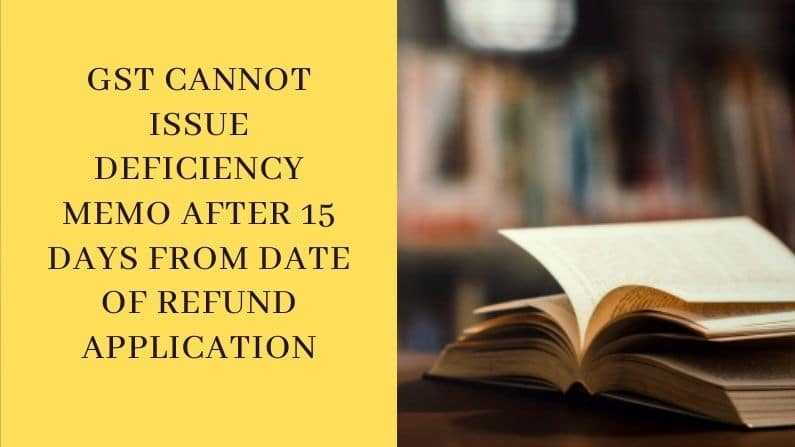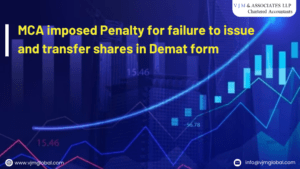On 22nd July, 2020, Delhi High Court ruled out an important decision in favour of M/S Jian International in the lawsuit of M/S Jian International vs Commissioner of Delhi Goods and Services Taxes (W.P. (C) 4205/2020). In the said judgement Delhi high court ruled that GST department can not issue deficiency memo after 15 days from the date of Refund application. Which means a refund application can not be rejected on the ground of deficiency in documents if the department does not issue deficiency memo within 15 days.
Delhi High court further said that as refund application has not been processed within 15 days from date of filing of refund application, then refund application should be assumed as completed in all respect.
Under GST law, business houses are eligible for many exemptions and refunds; provided they timely submit the refund application and supporting documents. Further, the GST council is required to take necessary action, i.e., issue acknowledgement or deficiency memo, within a stipulated time as mentioned in the act. The Act sets the guidelines related to refund under Section 54 of the CGST Act 2017 read with Rule 90 and 91 of CGST Rules.
1. Brief facts of the case
M/s Jain International (“The Petitioner”) filed application for refund in Form GST RFD-01 for the month of August, 2019 on 4th November, 2019 claiming refund of INR 9,12,893.
As per Rule 90 of CGST Rules, respondent has to either point out discrepancy in filed refund application or accept such application within 15 days from date of filing of refund application.
Further, As per the Section 54(6) read with Rule 91 of CGST Rules, 2017, the proper officer has to refund at least 90% of the refund claimed on account of zero rated supply within 7 days from the date of acknowledgment issued under Rule 90.
In the given case, respondent failed to process refund application, i.e., neither issued acknowledgment in form GST RFD-02 nor issued deficiency memo in form GST RFD-03, within 15 days from date of filing of refund application. 15 days from date of filing expires on 19th November, 2019.
Therefore, the petitioner filed writ petition for seeking directions to respondent to grant refund alongwith interest under section 56 of CGST Act.
2. Contention of Petitioner – GST to allow 90% refund within 7 days
- The petitioner contended that the GST department is required to release 90% of refund amount within 7 days of issuance of GST refund acknowledgement.
- However, as the respondent failed to process the refund application, therefore, the petitioner is entitled to refund along with Interest under section 56 of CGST Act.
3. Contention of GST Department – Accepted delay and seek permission to issue deficiency memo
- The respondent accepted that there was a delay and leniency on their part.
- The authority asked for a formal deficiency memo that has to be issued as certain documents though annexed with the writ petition had not been uploaded by the petitioner along with its refund application from the bench.
4. Contention of Hon’ble Delhi HC – Granting permissions to issue deficiency memo after 15 days will impair the petitioner rights
Hon’ble HC held that as per Rule 90(2) and 90(3) of CGST Rules, respondent has to either issue deficiency memo or acknowledgment within 15 days from date of filing of refund application.
In case of any non-compliance on end of respondent, the petitioner is entitled to interest under section 56 of CGST Act.
Further, granting permissions to respondents to issue deficiency memo today will enable respondents to process refund applications beyond given timelines.
This will also impair the petitioner’s right of claiming interest from the date of filing of original refund application.
5. Decision of Hon’ble Delhi HC – Deficiency memo can not be issued after 15 days from the date of refund application date
The Hon’ble Delhi HC stated that the rules of the refund policies and acknowledgement are clearly stated in the Act. Therefore, there is no chance of leniency in abiding by rules.
As refund application has not been processed within 15 days from date of filing of refund application, then refund application should be assumed as completed in all respect.
Further, Rules 90 and 91 of the CGST Rules, 2017 provide a complete code with regard to acknowledgment, scrutiny, and grant of refund. The said Rules also provide a strict timeline for carrying out the aforesaid activities.
Respondent has lost the right to point out any deficiency at this stage.
Therefore, Hon’ble Delhi HC ordered respondent to issue refund to petitioner along with the interest on the delay within two weeks of the judgement.
6. Conclusion
The historical decision taken by the high court of Delhi proves that the law is the same for all and under no circumstances it will go against the set rules and act. The judgement passed by the high court further makes the public and business men believe that not only them but GST authority will also be held responsible for their leniency.
In case as a businessman you are facing the same issue, you should file a petition with the court over leniency of the authority.
Read more about Updated GST refund filing and claims process






